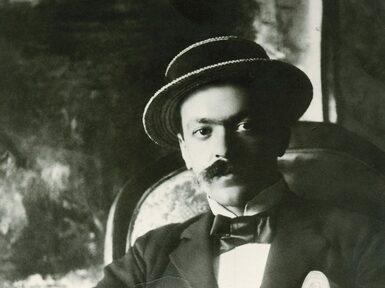On private lessons - Nathaniel Rich in NYRB:
‘Inopportuneness in all its manifestations—bad timing, rotten luck, missed connections—is the dominant theme of Italo Svevo’s life, work, and afterlife. Aron Ettore Schmitz was born of German and Italian descent in Trieste, itself a city of mixed parentage, the subject of a paternity dispute between Italy and the Austro-Hungarian Empire, and largely populated by Slovenians. Svevo spoke Triestine, a dialect that borrows from Slovenian, Greek, and German, and is unintelligible to other Italians. Although he wrote in formal Tuscan Italian, following national literary convention, it was for him a second language, and one he despaired of mastering. “Every Tuscan word we write,” he says in Zeno’s Conscience, “is a lie.” Schmitz’s cultural sensibility was neither Italian nor Triestine, however, but German. He attended boarding school in Swabia, where he was heavily influenced by the deterministic philosophy of Arthur Schopenhauer, and chose a pseudonym that reflected his mongrel identity (“Italo Svevo” means “Italian Swabian”). He was a Jew who converted to Catholicism to appease his wife, though only after receiving a dispensation for refusing to learn the catechism, leaving him in good standing in neither religion.’
(…)
‘When his firm opened a new factory in a London suburb, Svevo resolved to improve his poor command of English. He arranged for private lessons from a twenty-five-year-old Berlitz instructor who had developed the reputation, as Livia put it, of “a fashionable teacher of Trieste’s rich bourgeoisie.” Svevo called him “Professor Zois.” For one lesson, James Joyce asked Svevo to critique the first three chapters of a novel that had stymied him; Svevo’s homework assignment encouraged Joyce to finish A Portrait of the Artist as a Young Man. When Svevo admitted that he, too, had written fiction as a young man, Joyce read his novels within days. At their next lesson Joyce declared that Svevo had been unjustly neglected by his critics and was the most important Italian writer of his era. He recited passages of Svevo’s fiction from memory.’
(…)
‘Svevo was a man with nothing to lose and he wrote like it, abandoning all accommodations to popular and critical convention. His prose became simple and unadorned, almost childishly so. His authorial stand-in was unreliable and unapologetically obnoxious. Freeing himself from the formal strictures of the nineteenth-century novel, he gave himself over fully to his obsessions.
The novel is the memoir of Zeno Cosini, a chain-smoking, sexually delirious, bumbling, self-doubting valetudinarian who writes the story of his life at the behest of his psychologist, Dr. S. (for Svevo?). The narrative logic is neither chronological nor thematic but associative, following the caprices of memory. It begins with Zeno’s account of his frequent attempts to quit smoking, which happens to be the best thing ever written on the subject, with its chronicle of his many “last” cigarettes, each described with the kind of tenderness reserved for past lovers. There follow chapters about the death of his father; the bungled wooing of his boss’s daughter, which results in Zeno’s engagement to her squinty-eyed sister; his failures at adultery, despite his most fastidious efforts to succeed; and his erratic business career. Central to the novel is the division that Zeno makes between sickness and health, a dichotomy that in Svevo’s convolutions assumes a thunderous metaphorical power.’
(…)
‘Yet in the century since, readers hoping for further encounters with Svevo’s genius have typically turned to the earlier novels, with disappointing results. While Una Vita and Senilità were ahead of their time, they also lagged well behind Zeno’s Conscience; the novels belong to the realist tradition that Svevo undermines, but does not fully escape, until his masterpiece. The audacious, indefatigable Frederika Randall, who completed this new translation shortly before her death, makes clear in her artful rendering of Svevo’s “irregular style” that A Very Old Man is Zeno’s legitimate heir. The lineage extends well beyond the identity of the protagonist. The dark irony, self-flagellating introspection, manic obsessiveness, and unapologetic moral perversity—the qualities that make Zeno one of the most thrilling works of the twentieth century—cackle from every page.’
(…)
‘The major shift comes within Zeno himself. Though he continues to speak of life in terms of a fatal disease, obsess over his health, and gleefully catastrophize (“when I see a mountain I always expect it to become a volcano”), his aged heart’s not entirely in it. The old angst has dried up. Zeno is no longer imprisoned by his desires; now, instead, he finds himself “in a rather enjoyable state of freedom…Long life cures all ailments.” He even discovers that his accursed cigarette addiction, by inhibiting his appetite, has helped ward off his weight problems. In short, the miracle cure prescribed by Dr. S. on the opening page of Zeno has succeeded. The act of writing his autobiography has rejuvenated him.
Yet it is only while writing that the cure holds. “I have to think and write in order to feel alive,” he laments. Rereading the diary entries that constitute Zeno’s Conscience, Zeno concludes that his account of his life story is “the only important thing that has ever happened to me…How alive that life is, and how definitively dead the part I didn’t recount.”’
Read the complete article here.
I tried to read ‘Zeno’ when I was 18 or 19, I could not finish it. Too young probably.
But I have a weak spot for Trieste and its small Svevo-museum that I visited twice.
Justice and luck are as we know sometimes inseparable. You take private lessons to study English and suddenly you are not a failure as a writer anymore.
Svevo apparently managed, thanks to Joyce, to create its own version of the poetics of failure, a version that is so connected to Trieste, which itself is a city that symbolizes the poetics of failure in a beautiful manner.
